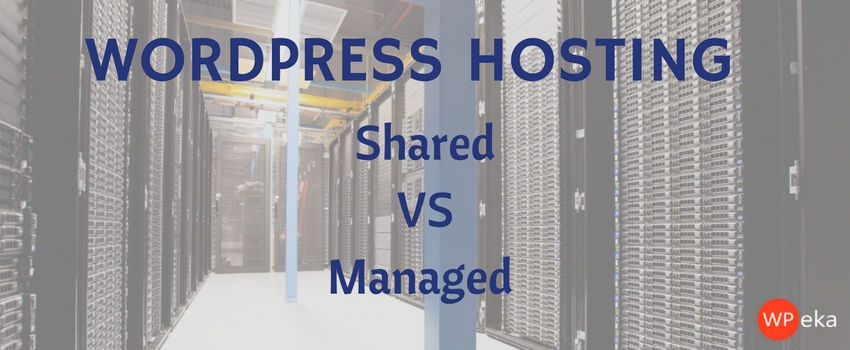Shared vs Managed WordPress Hosting: Which one is better?

If you’re just starting out with a new website, pretty much anywhere you look will tell you that the first things you will need are a domain name and web hosting. Even for complete beginners getting a domain name (like www.mysite.com) is pretty straightforward. Obviously, your website needs an address on the web. Web hosting, however, can be a little bit confusing.
A good way to think about it is this: if your domain name is your address on the web, your webhost is like your landlord. Like landlords, some webhosts are better than others.
When it comes to WordPress, there a lot of options for web hosts, but there are two basic types of web hosting plans: Shared Hosting and Managed WordPress Hosting. So, which is one is right for you?
Shared vs. Managed WordPress Hosting: The Basics
Shared hosting is, without question, the cheapest option for hosting a website, whether you’re building with WordPress or not. For those looking to get started on a tight budget, shared hosting is a popular choice.
Managed WordPress Hosting is, in a nutshell, technically superior in every way to shared hosting. However, it is more expensive. Managed hosting caters to sites with specific needs, and for basic sites it may be overkill.
What are the Issues With Shared Hosting?
Shared hosting isn’t inherently bad, and for some users it may be a completely suitable option for hosting. However, it is good to be aware of potential issues related to shared hosting.
As the name suggests, shared hosting means that hundreds (or thousands) of websites are sharing one server. This server only has a certain amount of memory.
If, for example, one of the websites on the shared server produces a hilarious cat video that goes viral, that website may see a sudden huge spike in traffic from social media platforms.
That spike in traffic to one site will suck resources from the shared server away from other sites, causing them to slow down or, in some cases, simply not load at all.
In that kind of situation, there is not much recourse for the owners of the affected sites.
Because all resources are shared (bandwidth, storage, processing power, etc), shared hosting tends to be slower and less dependable than managed WordPress hosting.
What to Expect with Managed WordPress Hosting
Advantages:
Speed

- Because shared hosting caters to a wide variety of sites, it must be able to run a number of applications and platforms, and not just WordPress sites.
- Managed WordPress hosting is configured specifically for a WordPress environment.
- Server-level caching combined with ideal configurations of Apache, MySQL, and PHP optimize site performance
- Faster page load speeds mean a better user experience for visitors and an improvement in SEO score
Also read: DreamPress Review: A WordPress Hosting Provider
Security

No matter what kind of hosting you have, there is always a possibility that your site can be hacked. However, managed WordPress hosting will reduce the odds of this happening and, if it does, the issue will likely be resolved quickly.
- Shared hosts typically have basic security protocols in place to scan for threats, but they are not specific to WordPress.
- Managed WordPress hosts have a much more robust security infrastructure in place.
- Most standard managed hosting plans include daily malware scans.
- Most managed plans have protocols in place to prevent threats such as DDoS attacks, which are becoming increasingly disruptive throughout the web.
Tech Support

- Managed WordPress hosting typically includes everything from the initial setup and install of your site to troubleshooting, updates, and full-time tech support.
- In the event that something does go wrong, managed hosting plans will have accessible tech support with WordPress knowledge available to resolve the problem as quickly as possible.
- Shared hosts typically do have some form of tech support. But, they will generally not have the kind of personalized, WordPress-specific knowledge that you will get via managed hosting.
Automated Site Backups

Never underestimate the importance of backing up your site!
- Managed hosting plans almost always include daily, automated backups of your entire WordPress site.
- Shared hosting often has the option to create backups via cPanel, but these backups are typically stored on the same shared server. This means that if the server is compromised, your backups are just as vulnerable as your live site.
- Also, restoring a backup from shared hosting is not usually as easy as clicking a button.
- Managed hosting, however, almost always offers “one-click” backup restores. Should you need to, you can have your entire site back up online in seconds.
Automated Updates

- When it comes to running a truly optimized and secure WordPress site, updates matter a lot. This means not only staying current with themes and plugins, which are familiar to most WordPress users, but also the operating system running on your hosting server, PHP, and MySQL.
- Managed hosting ensures that everything from the server to the version of WordPress running on your site will be up-to-date. It also ensures optimum performance, stability, and security.
- In shared hosting, server settings will not necessarily be optimized to suit the needs of your site. It will be optimized to meet the needs of the broadest spectrum of sites sharing the server.
Must read: 20 Best WordPress hosting providers
The Disadvantages
Price

Obviously, there are a lot of upsides to managed WordPress hosting. For most people, the biggest hurdle when it comes to choosing between shared hosting and managed WordPress hosting is the cost.
- Managed WordPress hosting provides a lot of value, and because of that it is considerably more expensive.
- Basic shared hosting plans can be as low as $4/month, whereas entry-level managed hosting plans run around $30/month, although options vary from one provider to another.
- To accommodate high-traffic websites, managed hosting plan that run on virtual private servers can cost somewhere between $150-$250 per month.
- If you’re running a serious e-commerce business or a high-traffic website, the additional cost of managed hosting will almost certainly be a worthwhile investment.
- For smaller personal sites or blogs, shared hosting can, in many cases, be a totally adequate solution.
Plugin Restrictions
- A lot of companies that offer managed WordPress hosting have restrictions on certain plugins. This is almost always related to efficiency and/or security.
- Some plugins, like caching plugins, are often disabled because caching is already handled by the server, and therefore they are redundant.
A Little “Too Helpful”
- For tech-savvy users who are comfortable working with the WordPress platform, having your webhost manage your site may cause you to feel like you have less control over your site.
- Many managed hosting companies handle WordPress installation and maintenance for clients. This means that you may not be able to access or alter files, plugins, or themes.
- Ultimately, however, a managed hosting plan will provide a level of security to a WordPress site that most users. Because there are many vulnerabilities with WordPress sites, having professionals manage this aspect of your site may be well worth a loss of control in other areas.
This infographic by codeinwp.com gives you detailed analysis of which hosting service you should get.
Which Type of Hosting is Right for You?
- There are a lot of clear advantages to managed WordPress hosting. The only real reason not to go with managed hosting is the potentially hefty price.
- If you are planning on running a high-volume WordPress site, particularly involving e-commerce, the cost of managed hosting will almost certainly be worth it for you.
- For a smaller, personal site or blog, managed hosting might be overkill. Many thousands of websites run very successfully on shared hosting platforms.
- For new website owners who are just starting out, shared hosting is a perfectly viable option.
- Particularly if you take steps to optimize images, limit plugin usage, and use a caching plugin, even websites on shared hosting plans can enjoy fast load speeds.
- If your site grows and you find yourself needing to expand and optimize, you can always migrate to a managed hosting plan.
Conclusion
Perspectives vary, and there is no one “best” solution to web hosting. The best solution for you depends on your needs and the level of involvement you want in running your site. If installing WordPress through cPanel, running updates, and backing up your database sounds like a terrifying chore. A managed hosting plan may well be worth the extra dollars each month. If you’re willing to put in a little more grunt work to optimize and secure your site yourself in order to keep costs down, then shared hosting can be a great option.
Regardless of which type of hosting you choose, be sure to do some research and choose a reliable webhost. It should emphasize on features like speed, tech-support, database backups, or security. Most popular webhosts offer plans with scalability in mind, meaning that if you start small you can always upgrade your plan to provide more resources to your site as it grows and develops.

Leave a Reply